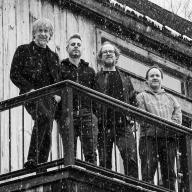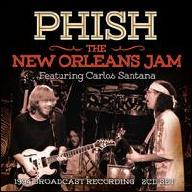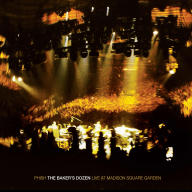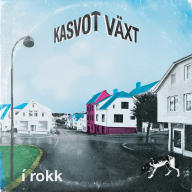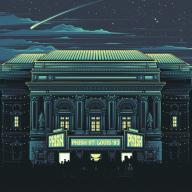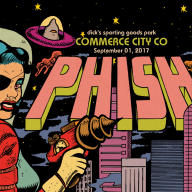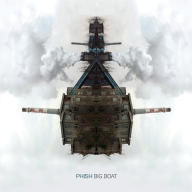The initial trio of guitarist/vocalist Trey Anastasio, drummer Jon Fishman, and guitarist Jeff Holdsworth began playing together in 1983 while attending the University of Vermont. In reply to a want-ad posted around campus, bassist Mike Gordon joined soon after, completing the group's original lineup. By late 1984, they'd christened themselves Phish and began performing off-campus concerts. At this stage in their career, the band was augmented by percussionist Marc Daubert, who left around the time keyboardist Page McConnell joined the band. With Holdsworth's departure in mid-1985, Phish's core membership was set.
Early in 1989, the band self-released their debut album Junta, which they sold on cassette at shows. Touring for the first time outside of New England, Phish's reputation preceded them and fans began to flock to gigs that often featured bizarre stage stunts involving trampolines, vacuum cleaners, and wild improvisations. Their follow-up album, Lawn Boy, arrived in 1990 via the Rough Trade subsidiary Absolute A-Go-Go. Throughout early 1991, Phish toured America, building up a significant-enough profile that Elektra soon signed them. 1992's A Picture of Nectar marked the band's major-label debut and they headed out on an extensive national tour to support the album, including a handful of shows on the H.O.R.D.E. tour. That same summer, Elektra reissued Lawn Boy and Junta, which gave fans greater access to the band's early material. They also toured Europe for the first time. Rift, Phish's fourth album (and the first to employ a producer), appeared in February of 1993. During their 1993 tour, the group sold tickets specifically designed for those fans who were taping the concert, a major gesture of goodwill. Hoist, the band's fifth album, was released in 1994; one of its songs, "Down with Disease," became Phish's first video and received some airplay on MTV. Hoist sold better than the group's previous albums, which was an indication of how large the group's fan base had become. In the summer of 1995, they released the acclaimed double-live album A Live One, which attempted to definitively capture the Phish concert experience. Having already established their own distinctive and devoted fan base, the group soon inherited a large number of displaced Deadhead's following the sudden death of Grateful Dead founder Jerry Garcia. Anastasio would later act as Garcia's stand-in during the Dead's 50th anniversary Fare Thee Well shows 20 years later.
The year 1996 saw two additional releases -- one of them a Trey Anastasio solo project (a free-form jazz side project called Surrender to the Air), and the other a full-fledged Phish album entitled Billy Breathes. Produced by Steve Lillywhite, Billy Breathes garnered the group's best reviews yet and peaked at number seven on the Billboard 200. Slip, Stitch Pass, the band's second live LP, followed in 1997, and Phish continued their prolific output in 1998 with the studio effort Story of the Ghost. Hampton Comes Alive, a six-disc release that captured four full live sets over the course of two performances, appeared in late 1999 and went gold, a testament to Phish's rabid following. The band's popularity only grew during the latter half of the '90s, as their ceaseless touring helped make them one of the top concert draws in the nation. In the spring of 2000, Phish delivered the pastoral studio effort Farmhouse, which was hailed as one of their finest and tightest releases to date; they also landed some mainstream exposure thanks to the single "Heavy Things." However, exhausted by touring and separation from their families, they decided to take an extended break, announcing a temporary breakup in October 2000. One month later, Elektra reissued The Siket Disc, which was previously available only through mail order; it featured improvisational tracks from the band's 1997 Story of the Ghost sessions.
Each member branched out in different directions during this period. Anastasio released a series of demos before collaborating with Primus bassist Les Claypool and former Police drummer Stewart Copeland for the bizarre Oysterhead project. He also released an eponymous solo album during the spring of 2002. Jonathan Fishman worked with his own side project, Pork Tornado, as well as the touring jazz combo Jazz Mandolin Project. Page McConnell released the first recordings from his other band, Vida Blue, and contributed keyboards to Tenacious D's first record. Mike Gordon, meanwhile, did some work with friend and former employer Col. Bruce Hampton; he also dabbled in film work, both in front of and behind the camera. Finally, both Gordon and McConnell worked on Gov't Mule's The Deep End, Vol. 1.
As for the band, Phish became more a part of American culture than ever before, and they made an appearance on The Simpsons before releasing a massive set of live albums (as well as a DVD) during the spring of 2002. By the end of the year, the group bowed to pressure and announced that they would begin to play live dates again, starting at the end of December. Touring soon commenced and continued for a year and a half; however, following the release of Undermind, the group decided to officially call it quits in the summer of 2004. Of course, this didn't mean that more albums couldn't be released, as a slew of releases kept the band's spirit alive while maintaining demand for Phish's reunion. The year 2005 saw the release of a 1995 New Year's Eve concert at Madison Square Garden, 2006 witnessed another live album with Live in Brooklyn, and 2008 brought the mammoth At the Roxy (Atlanta '93), which compiled eight discs of live concert material into one package.
Phish's official reunion arrived in March 2009, when the band played three sold-out shows at the Hampton Coliseum in Virginia. A reunion tour was launched that summer (with venues including Fenway Park and the main stage at Bonnaroo), and sporadic shows continued throughout the year. In addition to playing live, Phish also released their first studio album in years, having partnered with former Billy Breathes producer Steve Lillywhite for the creation of 2009's Joy; the album debuted at 13 on the Billboard Top 200. From that point on, Phish toured regularly, appearing at festivals of their own making and headlining other events, including the Austin City Limits Music Festival, Outside Lands, and Bonnaroo. Along the way, some archival releases appeared, including the 2013 box set Ventura, which housed two late-'90s concerts performed at the Ventura County Fairgrounds.
In 2013 Phish reconvened at their Vermont studio, the Barn, for writing sessions that resulted in a set of ten songs for a new studio album. The bulk of the songs were debuted live at their Halloween concert in Atlantic City, after which the band decamped to Nashville to record with famed producer Bob Ezrin. Entitled Fuego, their tenth album was released in June 2014 and was warmly received as one of their best studio efforts in years. They subsequently reunited with Ezrin for a follow-up album, Big Boat, which arrived in October 2016.
During the summer of 2017, Phish played a 13-night residency dubbed "The Baker's Dozen" at Madison Square Garden. For each of the concerts, the band didn't repeat a single song. Phish toured during the summer of 2018, then turned their attention to their traditional Halloween concert, this year "covering" the entirety of i rokk, the lone album by a fictional '80s prog rock band they'd invented called Kasvot Vaxt. Another year filled with touring followed in 2019, and the group released Sigma Oasis -- their 15th studio album -- in April 2020. ~ Stephen Thomas Erlewine, Rovi


